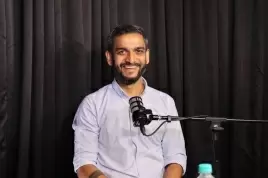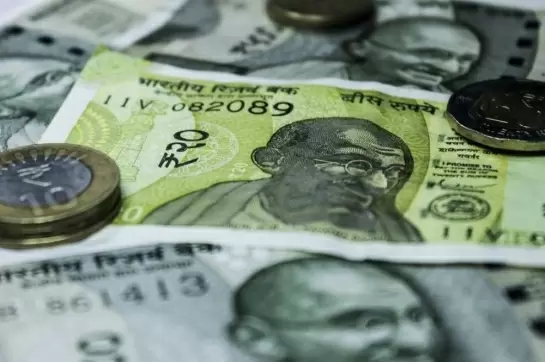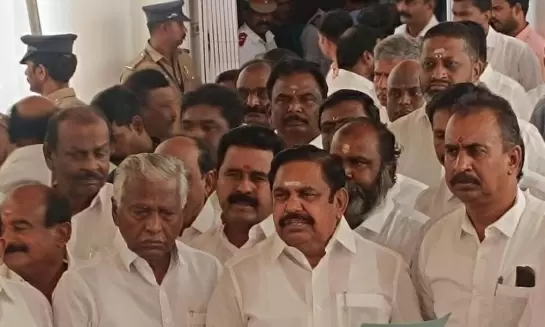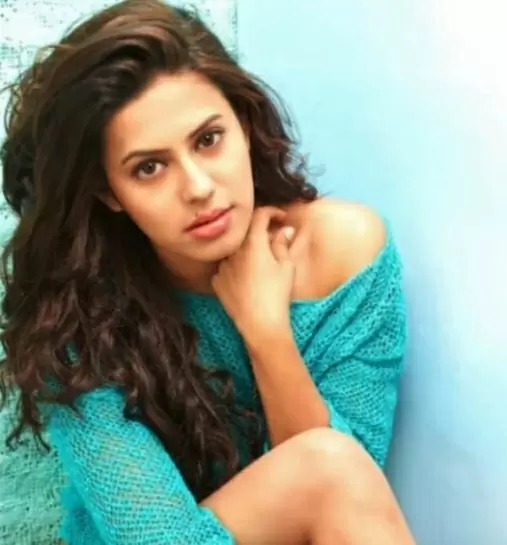Against all odds, these women shone like stars in the dark sky of insensitivity

20-April-2012
Vol 3 | Issue 16
These women just cannot take injustice and discrimination lying down; they are ever ready to reach out to the poor, the powerless, those who are unable to stand up for themselves.
They are gutsy and can clearly see through the divisive politics at work in society today. Meet the seven women, who have stood tall alongside the numerous voiceless women and children who were at the receiving end of violence and destruction during the Gujarat riots of 2002.
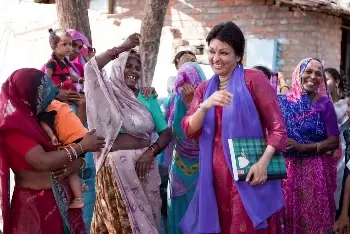 |
|
Mallika Sarabhai followed her gut and decided to contest the general elections in 2009. She felt that the Parliament was the best platform for ushering in change (Photo: Friends For Democracy)
|
For Shabnam Hashmi, Vrinda Grover, Teesta Setalvad, Zakia Soman, Sheba George, Noorjahan Diwan and Mallika Sarabhai, it's been a decade of crusade fraught with threats and hurdles, setbacks and, of course, victories.
The arson on board the Sabarmati Express near Godhra - in which 58 lives were lost - followed by widespread communal violence and rioting across Gujarat in February-March 2002, proved to be an "eye-opener", a "turning point", a "defining moment"...
Says Hashmi, the founder trustee of the NGO, Anhad, "The riots really shook me and I rushed to Gujarat. I was horrified to see the number of women who had been brutally gang-raped. Right then I decided that come what may I had to do something for these women. The last 10 years have been a very unusual journey for me."
Adds journalist-activist Setalvad, who has been questioning the role of the state government during the riots, "I had been covering Gujarat since 1991 and felt that in the interest of lasting social peace and national integration, the Indian justice system must show itself up to punishing the perpetrators."
Another activist who joined forces in the fight for justice was Zakia Soman, the co-founder of the Bharatiya Muslim Mahila Andolan (BMMA).
She says, "I was inspired by the grit and determination of ordinary women who had no education, no economic privileges and yet wanted to raise their voices for justice. I realised that I had to join the movement."
For Ahmedabad-based Noorjahan Diwan, the dark days of the riots have turned out to be life changing. Even today this housewife-turned-activist can clearly recall the fear she experienced, as battles waged on the streets of her city, "It was really traumatic. We not only faced financial lows, I was even forced to put my four-year-old daughter in a hostel in order to keep her safe."
Of course, the process of healing has been long and tough and each woman has taken a different route. Hashmi decided to engage with the community through workshops and cultural programmes; Grover, a well-known lawyer-activist, took up the case of Ishrat Jehan, who was gunned down by the Gujarat police saying that she was involved in terror activities; while Sarabhai contested the 2009 general election as an independent candidate.
Hashmi says, "I responded to the needs of the minority community and engaged with the majority community in order to bring about a change in mindsets through training, workshops, film screenings and cultural programmes."
On the other hand, Grover was "contacted by Ishrat's family to take up their case". She says, "It was the conviction of her mother, Shamima Kauser, and the family's determination to have Ishrat's name cleared that persuaded me. They wanted their respect and dignity restored."
Last year, the Special Investigation Team (SIT) set up to probe the case told the Gujarat High Court that the Ishrat Jahan encounter was not genuine. After the SIT filed its report, the court ordered that a complaint under Indian Penal Code Section 302 (murder) has to be filed against those involved in the fake encounter.
Grover may have succeeded in securing justice for one family but she cautions against the politics of hate, "To fight for Ishrat's truth was part of the battle against fascism. It's very important to recognise the clear pattern of targeting a minority community and demonising it as the enemy.
“The mechanics of electoral democracy may not deliver justice and that makes the legal battle important so that the killers and their masterminds are unmasked and punished."
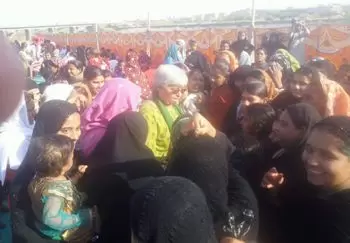 |
|
Shabnam Hashmi, the founder trustee of the NGO, Anhad, spending time with Godhra victims. (Photo: Anhad/WFS)
|
Even Setalvad has spent the last decade trying to expose the people behind the heinous violence that was unleashed in 2002.
"What provoked me to fight for the riot affected was the sheer scale and bestiality of the violence; of the premeditated pattern in which people were targeted in 300 locations across the state's 19 districts," she says.
Setalvad may be fighting a bevy of fake cases slapped against her for her audacity to question the powerful but she is forging on, "My conviction that a victim can transform into a survivor, who deserves justice and reparation, has enabled me to stand by the truth. I also believe that the equality and non discrimination provisions in the Indian Constitution can deliver justice and hope."
If Setalvad has reposed her faith in the democratic system, so have numerous victimised Gujarati Muslim women. This has inspired Zakia Soman into action, time and again.
"The most consistent and courageous fight against the communal forces has been put up by the Muslim women of Gujarat. In early 2002, I remember how angry these women were living in the relief camps. And yet remarkably they also had hope. 'So what if the state government is communal, we will go to parliament' - this was a statement I heard very often during those days," she says.
Over the years, Soman and the BMMA have taken out rallies and sat on 'dharnas' with ordinary Muslim women - mothers, wives, and sisters of POTA (Prevention of Terrorism Act) detainees and riot survivors - participating in large numbers.
"They kept up faith in democracy and fought. 'Hame insaf chahiye (we want justice)' has been their only motto," says Soman.
Another Ahmedabad-based activist and trained speech therapist, who went into the relief camps, post-riots, is Sheba George. She says, "At the Shah Alam relief camp it was painful to see the victims. We had to come forward and help. It was an inner calling."
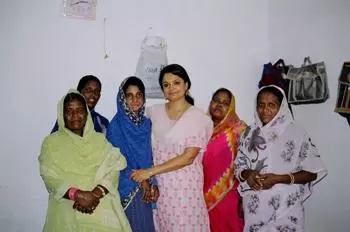 |
|
Ahmedabad-based activist and trained speech therapist, Sheba George with the riot victims (Photo: SAHR-WARU)
|
Sarabhai, too, followed her gut when she decided to contest the general elections in 2009. She felt that the Parliament was the best platform for ushering in change; for highlighting the problems being faced by the oppressed, voiceless women of her state.
In fact, after the carnage in Gujarat, one of the first voices to be raised in protest was that of this accomplished classical dancer. She says, "Today, certain forces have misconstrued the very idea of Hinduism. It's supposed to be about inclusiveness, acceptance and tolerance. I wanted to change perceptions."
Sarabhai was defeated in the elections but hasn't lost her positive outlook, "I continue to work for the people, and speak out on what's been happening here."
Incidentally, all of them have either received threats or have been booked under false cases. Says Diwan, who has been working for "quami ekta" in the relief camps, "There were times when even well-wishers suggested that my family and I shift out of Ahmedabad for our safety. But I have vowed to stay on and get justice for those who have been ruined in those riots." - Women's Feature Service









